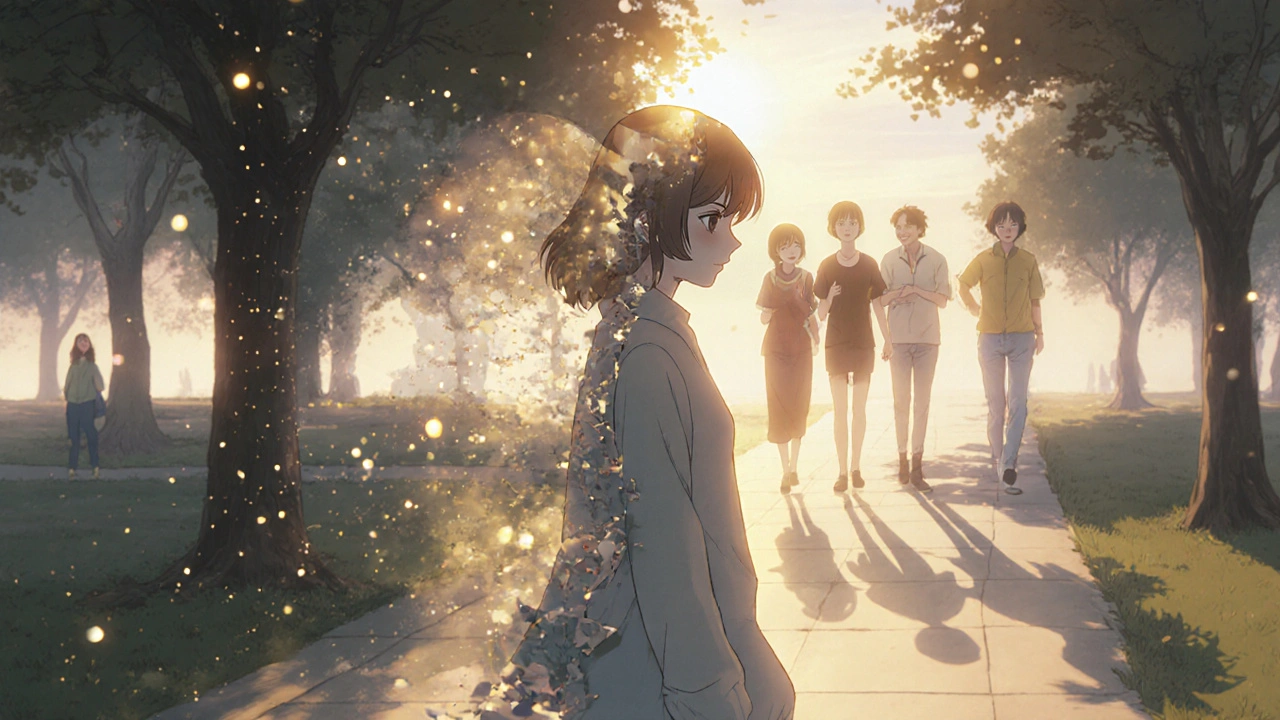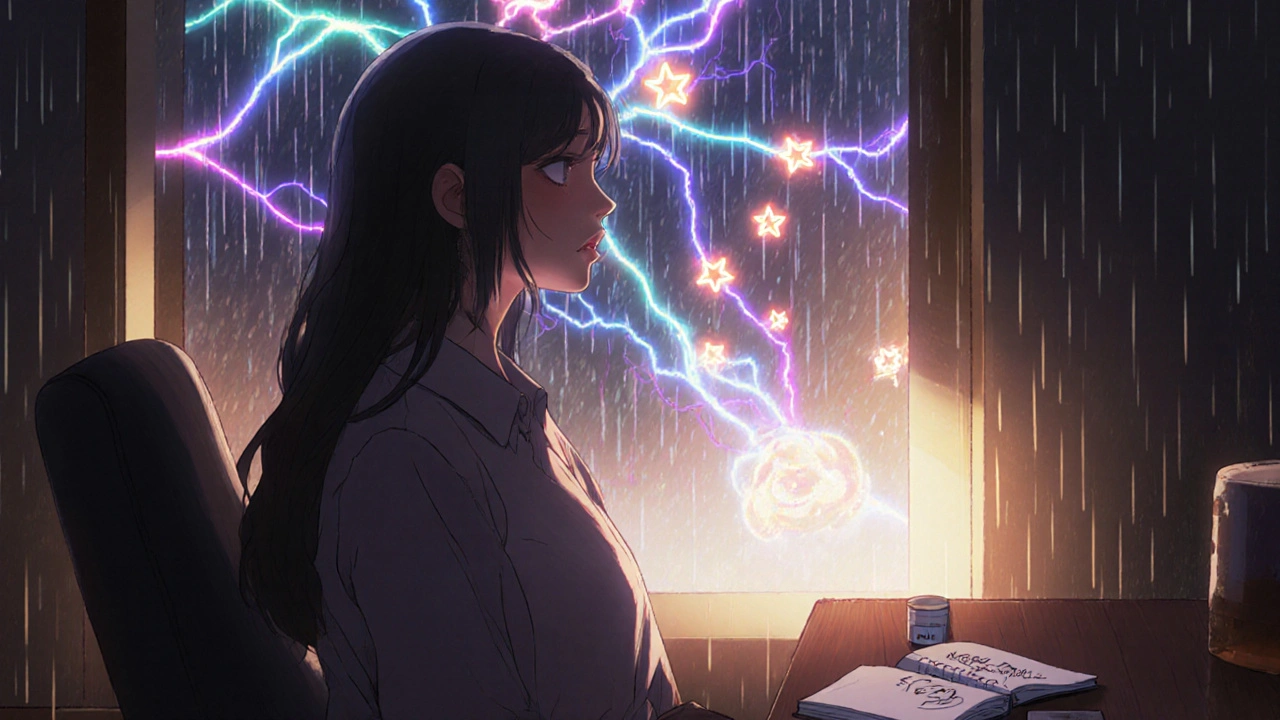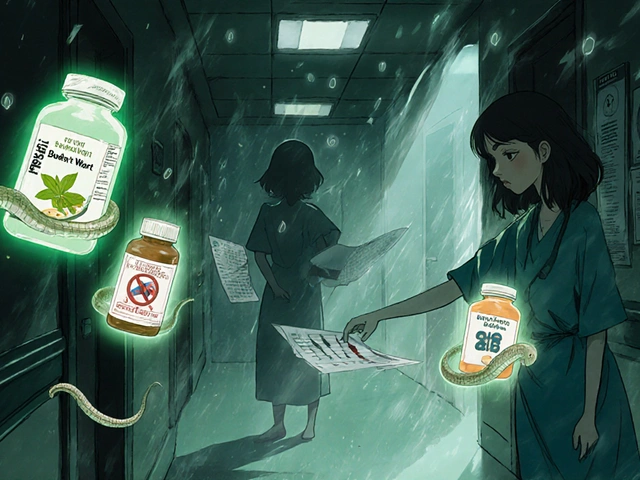
When you start taking anastrozole, most people focus on the physical side effects-joint pain, hot flashes, fatigue. But what no one tells you until it hits is how deeply it can mess with your emotions. You might wake up one day feeling like you’re drowning in sadness, or suddenly angry over nothing. Or maybe you just feel empty, like the spark’s gone out. If you’re on anastrozole and this sounds familiar, you’re not broken. You’re not overreacting. You’re experiencing a very real side effect of hormone therapy.
Anastrozole works by blocking estrogen production. That’s exactly what it’s supposed to do-for women with estrogen-receptor-positive breast cancer, lowering estrogen slows tumor growth. But estrogen isn’t just a reproductive hormone. It plays a key role in your brain. It helps regulate serotonin, dopamine, and other chemicals that control mood, sleep, and motivation. When estrogen drops fast, your brain doesn’t get time to adjust. The result? Mood swings, irritability, anxiety, or deep sadness that doesn’t go away with time or positive thinking.
A 2023 study in the British Journal of Cancer followed over 1,200 women on aromatase inhibitors like anastrozole. Nearly 40% reported significant emotional changes within the first six months. About 1 in 5 described symptoms severe enough to interfere with work or relationships. This isn’t rare. It’s common. And it’s not in your head.
People describe it in different ways:
These aren’t signs of weakness. They’re biological responses to a sharp drop in estrogen. Your brain is recalibrating under pressure. And unlike physical pain, emotional pain doesn’t show up on scans or blood tests. That’s why it’s often dismissed-or worse, blamed on stress or aging.
Not every low mood is caused by anastrozole. But here’s how to tell if it’s linked:
If you answered yes to most of these, your emotions are likely tied to the drug. That doesn’t mean you have to live with it. It just means you need to treat it like any other side effect-because it is one.

There’s no magic pill, but there are proven ways to manage this.
Many doctors assume mood changes are just part of “cancer stress.” But you deserve better. Bring up your symptoms specifically. Say: “My mood has changed since starting anastrozole. I’m not sleeping, I cry easily, and I feel numb most days. Is this expected? What can we do?”
Some oncologists will adjust your dose. Others may suggest switching to another aromatase inhibitor-like letrozole or exemestane-which some women tolerate better emotionally. A 2024 UK NHS survey found 28% of women who switched drugs saw noticeable improvement in mood within four weeks.
It’s not about running marathons. Just walking 20 minutes a day, three times a week, can lift your mood. Movement increases endorphins and helps your brain rebuild its chemical balance. You don’t need a gym. A walk around the block, gardening, dancing in the kitchen-it all counts.
A 2022 trial at the University of Birmingham found women on anastrozole who did light daily movement reported 40% less anxiety and 35% less depressive symptoms after 12 weeks.
Low vitamin D is common in women on hormone therapy-and it’s strongly linked to depression. Ask your GP for a blood test. If your levels are below 50 nmol/L, supplementation (usually 1,000-2,000 IU daily) can make a real difference. Many women report feeling more “present” after just a few months.
Cognitive Behavioral Therapy (CBT) isn’t just for people with “serious” mental illness. It’s a practical tool to rewire how you respond to negative thoughts. A CBT therapist can help you recognize when your brain is spiraling (“I’m a burden,” “Nothing matters”) and replace those thoughts with evidence-based ones (“I’m tired, but I’m still here. That matters.”).
The NHS offers free CBT through IAPT (Improving Access to Psychological Therapies). You don’t need a referral-just call or visit their website. Many women say it’s the most helpful thing they did during treatment.
Isolation makes emotional side effects worse. Find a support group-online or in person. Groups like Breast Cancer Now or Living With Cancer UK have forums where women share real stories about anastrozole. Reading someone else say, “I felt the same way,” can be a lifeline.
Some emotional changes need urgent attention. Call your doctor or go to A&E if you experience:
These aren’t normal. They’re medical emergencies. You don’t have to tough it out. Help is available, and it works.

Anastrozole treatment usually lasts five to ten years. That’s a long time to feel emotionally off. But here’s the truth: most women find their mood improves over time. Your brain adapts. Your body finds a new rhythm. You learn to recognize the waves and ride them instead of fighting them.
Some women say the worst emotional side effects peaked at 6-8 months and gradually eased by year two. Others needed to switch drugs. Either way, you’re not stuck. There are options. And you don’t have to suffer in silence.
Taking anastrozole is already hard. Your body is fighting cancer. Your mind is fighting a chemical shift. Don’t add guilt on top of that. Your feelings matter. Your pain is valid. And asking for help isn’t giving up-it’s the strongest thing you can do.
Yes, anastrozole can cause depression. Because it lowers estrogen, which affects brain chemicals like serotonin and dopamine, many women experience low mood, loss of interest, and feelings of hopelessness. Studies show up to 40% of women on anastrozole report significant emotional changes. It’s a known side effect-not a personal failing.
For most women, the worst emotional side effects peak between 6 and 12 months after starting anastrozole. Many notice gradual improvement after year two as the body adjusts. But some women need to switch medications or use therapy and lifestyle changes to manage symptoms long-term. There’s no fixed timeline-it varies by person.
Never stop taking anastrozole without talking to your oncologist. Stopping could increase your cancer risk. But you absolutely should tell your doctor how you’re feeling. They can help you adjust your treatment-whether that’s changing the drug, adding medication for mood, or starting therapy. Your emotional health is part of your cancer care.
Yes. Other aromatase inhibitors like letrozole and exemestane work similarly but may affect mood differently. Some women tolerate one better than another. Your oncologist can review your side effect profile and consider a switch. There are also non-hormonal options like tamoxifen, which doesn’t lower estrogen as drastically and may be gentler on mood-though it has its own side effects.
Absolutely. Cognitive Behavioral Therapy (CBT) is especially effective for anxiety and low mood caused by hormonal changes. It helps you identify negative thought patterns and replace them with calmer, more realistic ones. Many NHS patients access free CBT through IAPT services. It doesn’t replace medication, but it gives you tools to cope daily.
Many women on anastrozole have low vitamin D levels, which worsens fatigue and depression. Supplementing with 1,000-2,000 IU daily, especially in winter, has helped many feel more energetic and emotionally stable. Ask your GP for a blood test. If your level is below 50 nmol/L, supplementation is often recommended.
It’s very common-but it’s not helpful. Many women feel guilty because they’re surviving cancer, so they think they shouldn’t complain about side effects. But your emotional health matters just as much as your physical health. Feeling this way doesn’t mean you’re ungrateful. It means you’re human. Asking for help isn’t a betrayal of your strength-it’s proof of it.
If you’re reading this and feeling overwhelmed, start here:
You didn’t sign up for this. But you’re here. And you’re still fighting. That counts. Your emotions are part of your healing-not a sign you’re failing. Speak up. Reach out. Take the next small step. You’ve got this.
Bro. I was on anastrozole for 7 years. The emotional numbness? Real. I cried during a dog food commercial. Not because the dog died-because I couldn’t feel anything else. Then I started walking 20 mins a day. Not for fitness. Just to hear my own breath. It didn’t fix everything. But it gave me back the space to feel again. 🙏
You’re not broken. You’re recalibrating. And it’s okay to not be okay. I started CBT through IAPT last year. Didn’t think it would help. Turns out, it helped me stop blaming myself for feeling like a ghost. You’re not weak. You’re surviving. Keep going. 💛
Look I dont know why everyone is making such a big deal about this. Estrogen is just a hormone. If you cant handle a little hormonal shift maybe you shouldnt have gotten cancer in the first place. Also vitamin D? Thats like the cure for everything now isnt it. Like a magic pill for people who dont wanna take real meds. 🤷♂️
Samuel, I know you think this is all in people’s heads but I’ve been on this drug for 3 years. The panic attacks at 3am? The way I snap at my kid over spilled milk? It’s not stress. It’s biology. And dismissing it like you’re some kind of hormone guru? That’s the exact reason women don’t speak up. You’re part of the problem.
Look at all this emotional handholding. In my country we don’t have time for this. Cancer is serious. You take the drug. You survive. You don’t cry over commercials. You don’t need therapy. You need discipline. Vitamin D? Please. If you’re low on vitamin D you probably spend too much time on your phone and not enough in the sun. Fix your life.
While I appreciate the sentiment of this post, I must point out the lack of statistical rigor in citing "nearly 40%" without the confidence intervals. Furthermore, the reference to the British Journal of Cancer lacks a DOI or volume number. Without proper sourcing, this reads less like medical advice and more like anecdotal advocacy. Also, CBT is not a panacea. The effect size is modest at best.
lol anastrozole makes you sad? Bro. You think your body’s drama is unique? I took metformin and started crying during cartoons. But I didn’t post a 5000 word essay about it. Maybe just stop being so sensitive? Also vitamin D? Everyone’s low on vitamin D. Go outside. Stop being a victim.
Wow. Just wow. This is why I love America. We’re finally talking about mental health like it’s not a luxury. You know what’s more powerful than anastrozole? A woman who refuses to be erased by her diagnosis. I’ve seen women go from silent to screaming in support groups. And that? That’s the real cure. You’re not alone. You’re a warrior. 🔥
Everyone’s acting like this is new. Newsflash: estrogen drops = brain chaos. I’ve been on this since 2019. The guilt? The crying? The rage? All real. But here’s what no one says-you’re not supposed to "get over it." You’re supposed to adapt. And if you need meds for depression? Good. Take them. Don’t let anyone make you feel like you’re betraying your strength by needing help.
Let’s be honest. This is the new wellness-industrial complex. You take a drug. You get side effects. Then you’re told to walk, take vitamin D, do CBT, join a support group, and then you’re told you’re a hero for doing all of it. Meanwhile, the pharmaceutical companies are quietly profiting from your emotional vulnerability. The real solution? Stop taking anastrozole. But of course, no one will say that. Because then they’d have to admit there’s no perfect solution.
So… you’re telling me that if I feel like a robot after taking a hormone blocker, it’s not my fault? And I can just… go for a walk? And that’s it? I’m not sure whether to laugh or cry. But hey, at least I’m not the only one who’s been gaslit by the medical system. Thanks for the validation, I guess.
Man I took this stuff and all I felt was tired and sore. But I kept going to work. I didn’t cry over ads. I didn’t join groups. I just did my job. Maybe you guys are just too soft now. I mean cmon. We used to just deal with stuff. Now we need therapy and sunlight and memes. The world’s gone weird.
I’m a guy. Never taken anastrozole. But I’ve watched my sister go through it. The worst part wasn’t the pain. It was how nobody listened. Not even her own doctor. She felt invisible. So when I read this? I cried. Not because I’m emotional. Because it’s true. And someone finally said it out loud. Thank you.
Look I’m from Texas and we don’t do therapy here. We do grit. We do prayer. We do work. If anastrozole makes you sad then maybe you’re just not tough enough. And vitamin D? That’s what they give people who don’t want to go outside. I’ve got 4 kids and a farm. I don’t have time to cry over commercials. You need to man up.
